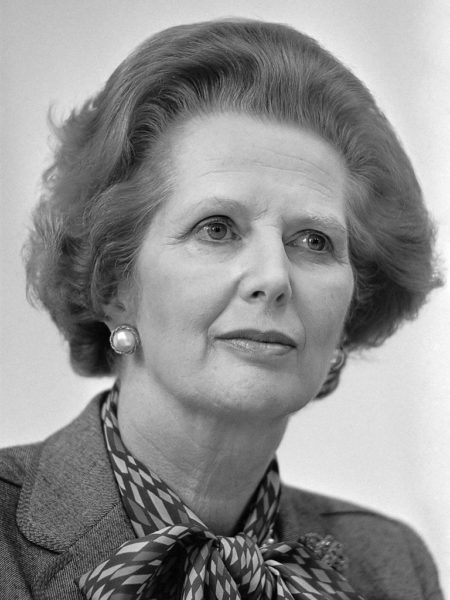The Canadian federal and provincial governments are no strangers to the (political) attractions of picking winners and losers in the market by providing subsidies to some favoured companies at the expense not only of their competitors but almost always of the economy as a whole, because the subsidies almost never produce the kind of economic return promised. The current British government has also been seduced by the subsidies game, as Tim Congdon writes:

Former British Conservative Prime Minister Margaret Thatcher in 1983. She was in office from May 1979 to November 1990.
Photo via Wikimedia Commons.
Why do so many economists support a free market? By the phrase they mean a market, or even an economy dominated by such markets, where the government leaves companies and industries alone, and does not try to interfere by “picking winners” and subsidising them. Two of the economists’ arguments deserve to be highlighted.
The first is about the good use — the productivity — of resources. To earn a decent profit, most companies have to achieve a certain level of output to attract enough customers and to secure high enough revenue per worker.
If the government decides to give money to a favoured group of companies, these companies can survive even if they produce less, and obtain lower revenue per worker, than the others. The subsidisation of a favoured group of companies therefore lowers aggregate productivity relative to a free market situation.
In this column last month I compared the economically successful 1979–97 Conservative government with the economically unsuccessful 2010–2024 Conservative government, which is now coming to an end. In the context it is worth mentioning that Margaret Thatcher and her economic ministers had a strong aversion to government subsidies of any kind.
According to Professor Colin Wren of Newcastle University’s 1996 study, Industrial Subsidies: the UK Experience, subsidies were slashed from £5 billion (in 1980 prices) in 1979 to £0.3 billion in 1990. (In today’s prices that is from £23 billion to under £1.5 billion.)
Thatcher is controversial, and she always will be. All the same, the improvement in manufacturing productivity in the 1980s was faster than before in the post-war period and much higher than it has been since 2010. Further, one of Thatcher’s beliefs was that if the private sector refuses to pursue a supposed commercial opportunity, the public sector most certainly should not try to do so.
Such schemes as HS2 and the Hinkley Point nuclear boondoggle could not have happened in the 1980s or 1990s. They will result in pure social loss into the tens of billions of pounds and will undoubtedly reduce the UK’s productivity.
But there is a second, and also persuasive, general argument against subsidies and government intervention in industry. An attractive feature of a free market policy is its political neutrality. Because market forces are to determine commercial outcomes, businessmen are wasting their time if they lobby ministers and parliamentarians for financial aid.
Honest and straightforward tax-paying companies with British shareholders are rightly furious if they see the government channelling revenues towards other companies who have access to the right politicians and friendly civil servants. By definition, the damage to the UK’s interests is greatest if the recipients of government largesse are foreign.



